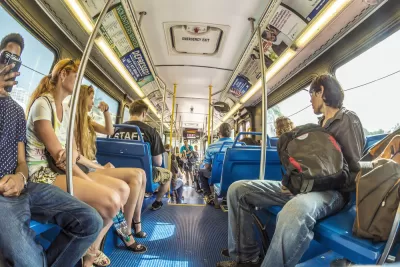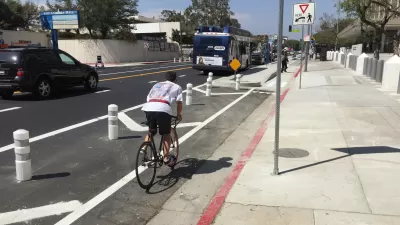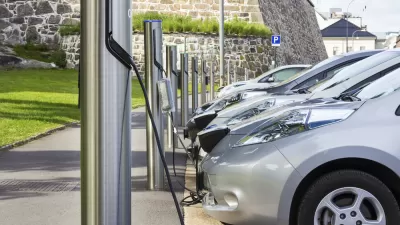Electric cars may garner a lot of attention these days, but significantly reducing carbon emissions and urban congestion means investing in high-quality mass transit.

Andrew J. Hawkins argues in favor of boosting public transit as a crucial way to fight climate change, warning against the potential "death spiral" caused by declining ridership which reduces revenue, leading to worse service which discourages riders even further. As Hawkins writes,
There’s more at stake than good buses and trains. The recent report from the United Nations Intergovernmental Panel on Climate Change confirms that a hotter, wetter, more inhospitable future is all but certain. The transportation sector is responsible for nearly a third of greenhouse gases, most of which come from tailpipe emissions. High-quality mass transit can do a lot to fight climate change, but only if people are willing to use it.
Since the start of the pandemic, transit agencies have struggled against a raft of challenges as some riders abandon their systems while essential workers and other transit-dependent commuters rely on public transportation more than ever. Agencies around the country are implementing major service changes and reducing or eliminating fares in an effort to get riders back on board and expand the reach of their systems, with mixed results. These initiatives will create more benefits than just improved transit service for those who use it, transit supporters argue. As Hawkins concludes, "high-quality transit is the only real solution to our vast, seemingly intractable problems with climate change, inequality, land use, and housing."
FULL STORY: PUBLIC TRANSPORTATION CAN SAVE THE WORLD — IF WE LET IT

Planetizen Federal Action Tracker
A weekly monitor of how Trump’s orders and actions are impacting planners and planning in America.

Maui's Vacation Rental Debate Turns Ugly
Verbal attacks, misinformation campaigns and fistfights plague a high-stakes debate to convert thousands of vacation rentals into long-term housing.

San Francisco Suspends Traffic Calming Amidst Record Deaths
Citing “a challenging fiscal landscape,” the city will cease the program on the heels of 42 traffic deaths, including 24 pedestrians.

Defunct Pittsburgh Power Plant to Become Residential Tower
A decommissioned steam heat plant will be redeveloped into almost 100 affordable housing units.

Trump Prompts Restructuring of Transportation Research Board in “Unprecedented Overreach”
The TRB has eliminated more than half of its committees including those focused on climate, equity, and cities.

Amtrak Rolls Out New Orleans to Alabama “Mardi Gras” Train
The new service will operate morning and evening departures between Mobile and New Orleans.
Urban Design for Planners 1: Software Tools
This six-course series explores essential urban design concepts using open source software and equips planners with the tools they need to participate fully in the urban design process.
Planning for Universal Design
Learn the tools for implementing Universal Design in planning regulations.
Heyer Gruel & Associates PA
JM Goldson LLC
Custer County Colorado
City of Camden Redevelopment Agency
City of Astoria
Transportation Research & Education Center (TREC) at Portland State University
Jefferson Parish Government
Camden Redevelopment Agency
City of Claremont





























